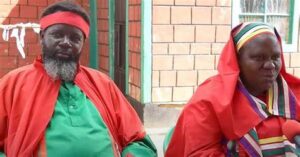Eliud Wekesa, popularly known as Yesu wa Tongaren, has disclosed that he was forced to consult the Bible to defend himself from unknown individuals pushing for his crucifixion during Good Friday.
Speaking in his hometown in Kakamega, Wekesa observed that some people had trespassed onto his property carrying a wooden cross and nails in anticipation of crucifying him according to what happened to Jesus Christ in the Bible on Good Friday while speaking at his hometown of Kakamega.
He claimed that in order to correct and chastise them for what he called blasphemy, he was forced to employ biblical teachings.
“We don’t commemorate Easter, it is not accepted at the doors of Jerusalem, meaning that people want to march in the spirit of carrying wooden crosses to mimic the crucifixion of Jesus.
“I even saw a person of Muslim religion carrying nails on the way here. I had to tell him that no one should be baited, you reap whatever you sow,” he stated.
Wekesa further rejected requests to have him executed on a cross in the manner of Jesus, claiming that his religious calendar still had the Easter festival set for July rather than April.
He used the fact that the present time frame observed globally by Christians as a remembrance of Jesus’ death and resurrection did not coincide with the Jewish calendar to demonstrate his thesis.
“I have my Easter in July which we observe according to the teachings from the Book of Exodus 12: 21-28,” he said.
“The Word says we should be cautious to avoid copying Western cultures; I have cautioned my followers in regard to this Easter.”

Wekesa captured the nation’s attention by proclaiming that he represented the much-discussed second coming of the Messiah, noting that he had worked miracles, boasting about changing drinking water into a cup of tea, and having a group of 12 disciples. He also noted that he had performed other miracles.
Kenyans could not help but mock him for his statements, with some even saying that he should be crucified like Jesus was in the Bible.








